必修五Unit 5 Section Ⅱ Warming Up & Reading — Language Points
人教版高中英语必修五workbook练习答案及听力原文
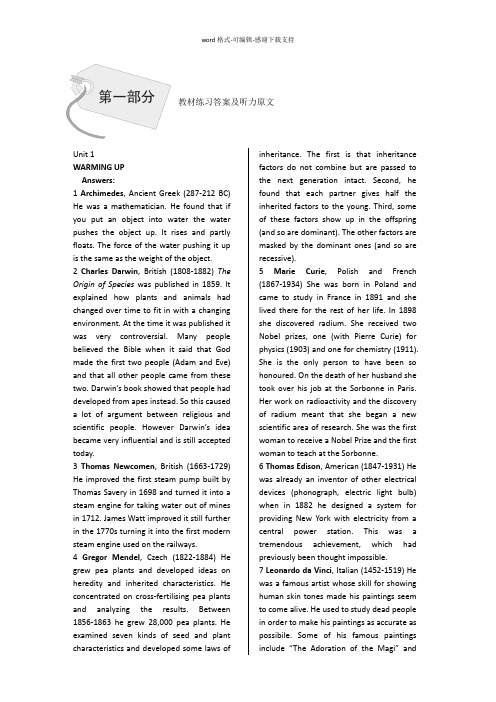
教材练习答案及听力原文Unit 1WARMING UPAnswers:1 Archimedes, Ancient Greek (287-212 BC) He was a mathematician. He found that if you put an object into water the water pushes the object up. It rises and partly floats. The force of the water pushing it up is the same as the weight of the object.2 Charles Darwin, British (1808-1882) The Origin of Species was published in 1859. It explained how plants and animals had changed over time to fit in with a changing environment. At the time it was published it was very controversial. Many people believed the Bible when it said that God made the first two people (Adam and Eve) and that all other people came from these two. Darwin’s book showed that people had developed from apes instead. So this caused a lot of argument between religious and scientific people. However Darwin’s idea became very influential and is still accepted today.3 Thomas Newcomen, British (1663-1729) He improved the first steam pump built by Thomas Savery in 1698 and turned it into a steam engine for taking water out of mines in 1712. James Watt improved it still further in the 1770s turning it into the first modern steam engine used on the railways.4 Gregor Mendel, Czech (1822-1884) He grew pea plants and developed ideas on heredity and inherited characteristics. He concentrated on cross-fertilising pea plants and analyzing the results. Between 1856-1863 he grew 28,000 pea plants. He examined seven kinds of seed and plant characteristics and developed some laws of inheritance. The first is that inheritance factors do not combine but are passed to the next generation intact. Second, he found that each partner gives half the inherited factors to the young. Third, some of these factors show up in the offspring (and so are dominant). The other factors are masked by the dominant ones (and so are recessive).5 Marie Curie, Polish and French (1867-1934) She was born in Poland and came to study in France in 1891 and she lived there for the rest of her life. In 1898 she discovered radium. She received two Nobel prizes, one (with Pierre Curie) for physics (1903) and one for chemistry (1911). She is the only person to have been so honoured. On the death of her husband she took over his job at the Sorbonne in Paris. Her work on radioactivity and the discovery of radium meant that she began a new scientific area of research. She was the first woman to receive a Nobel Prize and the first woman to teach at the Sorbonne.6 Thomas Edison, American (1847-1931) He was already an inventor of other electrical devices (phonograph, electric light bulb) when in 1882 he designed a system for providing New York with electricity from a central power station. This was a tremendous achievement, which had previously been thought impossible.7 Leonardo da Vinci, Italian (1452-1519) He was a famous artist whose skill for showing human skin tones made his paintings seem to come alive. He used to study dead people in order to make his paintings as accurate as possibile. Some of his famous paintings include “The Adoration of the Magi” andthe “The Last Supper”. Later in his life he lived in France where he designed a submarine and a flying machine.8 Sir Humphry Davy, British (1778-1829) He did research into different gases and discovered the medicinal value of nitrous oxide (or laughing gas) as an anaesthetic. In 1815 he developed a safety lamp for miners. Previously there had been many accidents when candles on the mi ners’ helmets had exploded when it came into contact with underground gas from the coal the miners were digging. The safety helmet made working underground very much safer.9 Zhang Heng, Chinese (78-139) He invented the first seismograph to indicate in the direction of an earthquake. It was in the shape of a cylinder with eight dragon heads round the top, each with a ball in its mouth. Around the bottom were eight frogs directly under a dragon’s head. When an earthquake occurred, a ball fell out of the drag on’s mouth, making a noise.10 Stephen Hawking, British (1942-) He has worked in astronomy and studied black holes in space. He has shown that black holes do not only absorb everything around them but, from time to time, throw out matter as well. This may mark the beginning of new galaxies. This is an advance on the old theory which said that black holes “eat” everything they come across. COMPREHENDINGAnswer key for Exercise 1:1 An outbreak of cholera hit London in 1854.2 John Snow began to test two theories.3 John Snow investigated two streets where the outbreak was very severe.4 John Snow marked the deaths on a map.5 He found that most of the deaths were near a water pump.6 He had the handle removed from the water pump.7 He announced that the water carried the disease.8 King Cholera was defeated.Answer key for Exercise 2:1 John Snow finally proved his idea because he found an outbreak that was clearly related to cholera, collected information and was able to tie cases outside the area to the polluted water.2 No. The map helped John Snow organize his ideas. He was able to identify those households that had had many deaths and check their water-drinking habits. He identified those houses that had had no deaths and surveyed their drinking habits. The evidence clearly pointed to the polluted water being the cause.3 Three diseases, which are similar today, are SARS, AIDS and bird flu, because they are serious, have an unknown cause and need public health care to solve them. Sample summary for Exercise 3:John Snow wanted to find the cause of cholera. He believed that people became ill after eating infected food. He used the next outbreak of cholera to test his idea. He studied a small area of houses which got their water from the same pump. Many people in the area died. John Snow showed that this was because the water in the pump was infected. He showed that cholera could be defeated if people drank clean water.LEARNING ABOUT LANGUAGE Discovering useful words and expressions Suggested answers to Exercise 1:1 victim2 physician3 analyse4 defeat5 challenge6 enquiry7 pump 8 blame 9 absorb10 link...toAnswer key for Exercise 2:1 severe2 suspected3 exposed4 experts5 cure6 foresaw7 concluded 8 announced 9 attendedAnswer key for Exercise 3:make a suggestion make a decision make a plan make a contributionmake a speech make a noise make a change make a descriptionmake an investigationSome possible examples for Exercise 4: 1 The teacher asked us not to make faces in class.2 I tried to make friends with my neighbour but he was too old and did not want to talk to me.3 The best way to make money is to study hard and gain good qualifications.4 I didn’t like them to collect me in their car so I made my way to the restaurant on foot by myself.5 I’m too tired to make dinner, so I decide to eat out.6 Before you pay for that new car make sure it has a guarantee, which will protect you against any problems during the first year.7 Don’t make up your mind about buying that house till you have seen a few more.8 When you leave your flat in the morning, it looks tidier if you make the bed before you go.9 I have tried to make room for her on that course but there are just too many people already attending it.Discovering useful structuresSome possible answers for Exercise 1:1 ...when he thought about helping ordinary people exposed to cholera.(attribute)2 He immediately told the astonished people in Broad Street to remove the handle from the pump.(attribute)3 He became interested in two theories.(pre-dicative)4 Neither its cause, nor its cure was under- stood.(predicative)Answer key for Exercise 2:Past Participle as theAttribute (1)Past Participle as theAttribute (2)1 terrified people 1 people terrified of(cholera)2 reserved seats 2 seats reserved by...3 polluted water 3 water polluted by...4 a crowded room 4 a room crowdedwith...5 a pleased winner 5 a winner pleasedwith...6 astonished children 6 children astonishedat/by...7 a broken vase 7 a vase broken by...8 a closed door 8 a door closed by...9 the tired audience 9 the audience tiredof...10 a trapped animal 10 an animal trappedin/by...Answer key for Exercise 3:1 blamed/upset2 tired3 disappointed 4shocked/depressed5 excited6 infectedUSING LANGUAGELISTENING TEXTA GREAT CHINESE SCIENTISTFather of the Chinese space programmeYu Ping (YP) is talking to her friend Steve Smith (SS) about Qian Xuesen and his work as a rocket scientist.Part 1YP: What do you want to be when you grow up, Steve?SS:I want to be an astronomer and visits stars. I wish to visit Mars one day.YP:I think I’d like to work in the space industry too. I’d like to be a rocket scientist like Qian Xuesen.SS:What did he have to do to become a rocket scientist?YP:Well, he first studied at university to bean engineer. Later he went to America to study for his doctor’s degree. It was then he began to work on rockets.SS:So it was lucky for our space programme that he came back to China.YP:Very much so. There was no work on space rockets in China before he began his institute to design and build rockets to go into space.Part 2SS:Do you think he wanted to travel into space in one of his rockets?YP:I have no idea but I believe he looked forward to the first space flight by a Chinese astronaut.SS:Yes. Now that China has sent satellites into space. I hope we’ll be the first to land on Mars. That would really be something special and if I were that astronaut I would put Qian Xuesen’s picture on Mars to show how much we admire his work.YP:Indeed. He is rightfully called the father of the Chinese space programme. He is my hero and he is why I want to be a rocket scientist.SS:Well, we’d better get on with our homework. We need good grades to get into university.YP:Right you are. See you, then.SS:See you.Answer key for Exercise 1:Students will give their own answers. Answer key for Exercise 2:Main Idea: It is about the role of Qian Xuesen in the development of space technology in China.Answer key for Exercise 3:1 Qian Xuesen first studied to be an engineer.2 In America he began to work on space rockets so that he was able to develop a space programme when he came back to China.3 When Qian Xuesen returned to China he set up a space institute to begin training people in how to design and build rockets. Answer key for Exercise 4:China’s achievement-sin spaceSteve Smith’s ambi-tions1 Chinese astronauts inspace2 Chinese satellites inspace1 become a rocketscientist2 be the first to land onMars and put QianXuesen’s picture there Answer key for Exercise 3:Students give their own answers.Students can show that they understand what is involved by making a realistic dialogue of their own.Sample conversation:MIKE: What do you want to do when you grow up?LI RU:I want to build robots. I will have to do a physics and mathematics degree in China. After that I hope to go abroad to Reading University in England where you can study all about robots. There is a special cybernetics department there.MIKE:What personality will be needed for that job?LI RU:I think I need to be patient for my ideas which will take a long time to develop.I also need to be creative enough to have good ideas.MIKE:What experience will be most useful to you?LI RU:I think technology and engineering projects. I hope to work in a factory in my holidays.MIKE:What kind of person makes a good inventor?LI RU:I think someone who is happy to persevere at something and learns from his mistakes.MIKE:Thank you. I think designing robots sounds fun.Reading and writingAnswer key for Exercise 1:Before Showing Copernicus’ theory Copernicus’ theoryA diagram showing the solar system with the earth at its centre A diagram showing the solar system with the sun at its centreAnswer key for Exercise 2:Students give their own answers.Sample writing:Dear Nicolaus Copernicus,I am a student studying astronomy and I would very much like to read your new theory about the solar system. I hope you will publish it for several reasons.I understand the problems with the present theory. The way the planets move is not what you would expect if the earth was the centre of the universe. It is also odd that the brightness of some stars seems to change. So I agree with you that we need a new theory.I know your observations have been very carefully carried out over many years. Now you must have the courage to publish them. Science can never advance unless people have the courage of their beliefs. I know you worry about what will happen if you publish your new theory. No matter how people oppose it, time will show whether your ideas are right or wrong.So I hope you will feel you can publish your new theory.Yours sincerely,(your name)Unit 2WARMING UPAnswers:1 C2 B (direct flight)3 B4 A5 B Question 1: The United Kingdom consists of England, Wales, Scotland and Northern Ireland. More about this appears in the first reading passage.Question 2: It takes ten hours to fly from Beijing to London Heathrow Airport if you take a direct flight.Question 3:It may appear to an outsider that the Queen has an important role in ruling the country. However, this is not so. Her position is ceremonial: opening Parliament, welcoming Heads from other countries, going on tours to other countries to encourage trade with Britain, etc. The Prime Minister together with his most important ministers (called the Cabinet) and his Members of Parliament (each from a different part of the country) make the important political decisions and the laws. Question 4: The counties of Britain are much smaller than provinces in China. They have local government powers for their area. Counties have several Members of Parliament depending on the size of their population. Large towns such as Reading have two MPs and the largest city in England outside London, which is Birming- ham, has ten MPs.Question 5: The Rivers Thames and Severn are very similar in length but the River Thames is slightly longer. The River Thames is 338 km and the River Severn is 290 km. The River Avon is much shorter. COMPREHENDINGAnswer key for Exercise 1:1 England, Wales and Scotland2 England and Wales3 England, Wales, Scotland and Northern Ireland4 Republic of Southern Ireland5 England/Great Britain/the UKAnswer key for Exercise 2:1 The country left out is Wales. It is usually assumed to be part of England.2 England, Scotland and Wales.3 The Vikings did not influence London.Answer key for Exercise 3:North: Leeds, York, Sheffield, Manchester Midlands: Coventry, BirminghamSouth: Reading, London, Brighton, PlymouthAnswer key for Exercise 4:Para 1, 2&3: what England includes; about Great Britain; the UK.Para 4:the geographical division of England into zones; their similarities and differences. Para 5&6:the cultural importance of London.Possible summary: The writer examines how the UK developed as an administrative unit. It shows how England is also divided into three zones. It explains why London became the cultural capital of England. LEARNING ABOUT LANGUAGE Discovering useful words and expressions Answer key for Exercise 1:1 unwilling2 countryside3 conveniences4 clarify5 constructing6 Kingdom7 administration 8 accomplish9 enjoyableSuggested answers to Exercise 2:1 currency2 The Union Jack3 United; consist of4 broke away5 institutions6 conflicts7 provincesAnswer key for Exercise 3: 1 asked 2 whispered 3 screamed 4 begged 5 agreed 6 answered 7 shouted 8 complained 9 suggestedDiscovering useful structuresAnswer key for Exercise 1:1 ...to form the United Kingdom by getting Ireland connected in the same peaceful way.2 You find most of the population settled in the south, ...3 It has the oldest port built by the Romans...Suggested answers to Exercise 2:1 have got the house mended2 Have you had your hair cut?3 have the dictionary delivered4 haven’t had the film developed6 found it closed6 get it repaired7 got all their money stolen8 have it divided9 had some of his points clarified10 had/got some flowers sent; had it announced; had it organizedAnswer key for Exercise 3:Answers will vary.USING LANGUAGE ReadingListening LISTENING TEXT CAN A ROYAL PALACE ALSO BE A PRISON? Zhang Pingyu (ZP) is trying to find out moreDay 1 Comments Day 2 Day 31 Tower of London2 St Paul’s Cathedral3 Westminster Abbey4 Big Ben 1 delight, fancy2 splendid and interesting3 interesting, full of statues ofpoets and writers4 famous and very loud1 Greenwich withships2 clock (GMT)3 longitude line1 Karl Marx’s statue“strange he lived and diedin London”2 British Museum“thrilled to see Chinesepottery”about the history of the Tower of London from a guide (G).Part 1G:The Tower was the home of the King but also a prison. Many important people were kept there.ZP:I beg your pardon? Can you speak more slowly, please?G:Of course. Have you heard of “The Princes in the Tower”?ZP:No, I’m afraid not.G:These two princes were brothers, called Edward and Richard and they lived six hundred years ago. They came to London, for the older boy to become Edward Ⅴ, after his father, King Edward Ⅳ, died. ZP:I see. How old was he?G:He was only thirteen years old. His cruel uncle, also called Richard, was supposed to look after them both, but instead he had them killed while they were asleep.ZP:What do you mean? He killed them himself?G:No. He sent his men to kill them because he wanted to become King Richard Ⅲ. There is a story that on a dark night you can sometimes hear those princes crying.ZP:You can hear them crying? Really? I thought you said they were killed many years ago.G:Yes, but it’s only a story!Part 2ZP:Who else came to the Tower as a prisoner?G:A future queen. In the 1550s Queen Mary sent her sister, Princess Elizabeth, to the Tower as a prisoner.ZP:Strange! Why did she do that?G:She thought Elizabeth was a traitor. So she sent Elizabeth through a special gate called “Traitors’ Gate”. That only happen- ed to very bad people.ZP:I’m sorry I don’t understand. How did Elizabeth become Queen if she was a prisoner?G:Easy. Her brother and sister both died without children so Elizabeth became Queen Elizabeth Ⅰ. She tried not to be unfair to others when she was queen.ZP:I’m glad to hear that.Answer key for Exercise 1:1 Elizabeth later Queen Elizabeth Ⅰ.2 King Henry Ⅷ.3 Richard Ⅲ.4 Edward Ⅴand Richard.Answer key for Exercise 2:Ticks for brothers Edward Ⅴand Richard (sons of King Edward Ⅳ); King Edward Ⅳ; Richard (later King Richard Ⅲ); Queen Mary; Elizabeth (later Queen Elizabeth Ⅰ); Answer key for Exercise 3:1 Prince Edward (later Edward Ⅴ) was one of the princes murdered in the Tower. We know because:· both were princes· both were young boys· their uncle was Richard who later became King Richard Ⅲ.2 King Richard Ⅲkilled the princes because he wanted to become king.Answer key for Exercise 4:came, future, Mary, Princess, Tower, Strange, thought, through, Traitors’, happened Speaking and writingSample dialogue:S1: Excuse me. Are you a guide?S2:Yes, I am. Can I help you?S1:Can I ask you a question about the Temple of Heaven?S2:Of course. What do you want to know?S1:What’s this Temple for?S2:The Emperor came to pray for good crops and a good harvest for the country. He made offerings to the God and asked him for help.S1:Please can you speak more slowly? I’m afraid I can’t follow you.S2:I’m sorry. I’ll speak more slowly. This isthe Hall where the Emperor made his sacrifices to the Gods. You may not go in but just look through the door.S1:What did you mean by making sacrifices? S2:He killed many animals after making prayers. He was also dressed in special clothes.S1:I beg your pardon? Special clothes! I thought his clothes were always special! What were they?S2:They were clothes kept just for this occasion. He changed in a special yellow room and came out to go to pray to the Gods.S1:I see. When did this stop?S2:When the Emperors stopped ruling China.S1:Thank you. You have been most helpful.Unit 3WARMING UPSuggested answers:Present time In One Thousand Year’s TimeTransport Airplanes; cars;bicyclesNo longer by air because of environmental pollution; bicyclesand horses will make a comeback.Work Office; factory;construction;landscape; serviceAt home using advanced, interactive computers; meetings canbe conducted on the computer and people will see each otherspeak.Finance and currency Banks; offices;insurance; businessOne global currency—maybe the yuan as China will be thelargest global exporterLanguages English; Russian;ChineseOne global language—perhaps Chinese or still EnglishEnvironment Air: could beimproved in citiesVery poor; need to recycle all waste; control on the use ofcars; no airplanes; methods to improve poor air quality.Climate of the earth being very hot is making problems overwater resources.Education Nursery; schools;universityLonger than now possibly until 25 years of age so that studentscan learn all the new technologiesHouses Flats; houses;concrete; woodBuilt into the ground as the surface of the earth is so hot.Communica-t ion Post office; InternetBy thoughtpad, telephone, computer, mobiles, Morse code,etc.COMPREHENDINGAnswer key for Exercise 1:1 Li Qiang went into the future because he had won a prize that gave him a tour.2 He felt rather anxious when he left his own time but soon got it over.3 He went by time capsule.4 The first thing he noticed was the poor quality of the air and it gave him a headache.5 He found several things that were different:· a mask to give him enough oxygen· a hovering carriage· having a “time lag” experience·a strange-looking house that belonged to Wang Ping’s parents·trees that acted as walls and provided oxygen for the room·tables, chairs and a bed that were stored under the floorAnswer key for Exercise 2:Good changes Bad changesTime travel can travel to different times as you wish After-effects of travel Transport can move swiftly disorganized; difficult to find way Houses save living space short of spaceTowns busy; look like markets easy to get lostAir quality own family oxygen supply poor quality in public placesAnswer key for Exercise 3:Students give their own opinions in the class discussion.Answer key for Exercise 4:Paragraph1main idea: How I came to take a time travel journeydetails: my prize; my excitement2main idea: The journeydetails: how I felt; the spaceship; the journey3main idea: My impressions of life one thousand years into the futuredetails: little oxygen; masks to provide oxygen; hovering carriage; how to drive them; a“time lag” moment4main idea: Staying in Wang Ping’s homedetails: appearance of house; trees as walls; where furniture stored; ate meal; preparedfor sleepLEARNING ABOUT LANGUAGEAnswer key for Exercise 1:Suggested answers to Exercise 2:1 search for2 take up3 slide into4 sweep up5 press down1 search for2 swept up3 pressed down4 sweep up5 took up6 slid... intoAnswer key for Exercise 3:opportunities; constantly; stewardesses;previous; adjustment; tolerate; take up; losesight of; link; bentDiscovering useful structuresAnswer key for Exercise 1:1 Well-known for their expertise, hisparent’scompany...2 Hit by a lack...3 Exhausted, I slid into bed...Answer key for Exercise 2:1 Frightened by the loud noise, I went tosee what was happening.2 Hit by the lack of fresh air, he got a badheadache.3 Tired after the long journey, I still enjoyed meeting the aliens on the space station.4 Frightened by the noise outside, Sue dared not sleep in her bedroom.5 Built in 1910, the museum is almost 100 years old.6 Given some advice by the famous scientist, the student was not worried about his scientific experiment any more.7 Exhausted by a day’s work, George took some tablets to help him feel better.8 Very astonished by the amount of work in the new timetable(given by her boss), Lucy decided to leave her job immediately. Answer key for Exercise 3: 1 Soon we lost sight of that famous astronomer called Li Qiang.2 I am going to buy a painting copied from Vincent van Gogh.3 I like that old private house built of wood and mud.4 The room connected to the rest of the house by a long passage is completely empty.5 The queen was sitting in a royal carriage drawn by four horses.6 The vehicle mentioned in the book is unknown to me.7 Tha castle built in 1432 is under repair. USING LANGUAGESuggested answers to Exercise 1:Modern Inventions of the 31st CenturyOnly to be seen on the Space StationCommunication Waste Disposal Manufacturing Invention thoughtpad a waste machine manufacturing robotsadvantages 1 efficient2 environmentallyfriendly 1 disposes of all waste2 turns them into threegrades of useful ma-terial1 no waste2 no pollution3 no environmentaldamagedisadvantages thoughts must be clearor messages may bemixed up None people must live on aspace station to moni-tor the robotsCome and see how they work today!Sample dialogue for Exercise 2:S1: We’d really like to live and work in a space station in the 31st century. Of course there’d be a lot of work, but we’d really enjoy the leisure time we would have.S2: And the large number of robots that we could use to fill our spare time with!S1: Yes indeed! We both enjoy working with robots and find them lots of fun. We would train them to play football so that we could each have our own team and hold competitions.S2: Once we’d got two football teams we’d begin training the robots for a triathlon or three-skill competition. There would be running, swimming and finally a football match. That’d be fun too.S1: Robots are never tired so we’d train them to cook our favourite dishes and do all the housework throughout the spaceship. S2: When we get fed-up with competitions we’d arrange for the robots t o design us a beach area where we can sun-bathe and relax. I don’t think life could be better!S1: Nor do I!LISTENING TEXTCAN PEOPLE REALLY LIVE ON MARSLI Qiang(LQ) is interviewing WalkerHiller(WH) on the space station about his idea for building a new town called “Wonderworld” on Mars.LQ: Well, Mr Hiller Why did you think of building a new town on Mars?WH: It sounds astonishing, doesn’t it? I imagine that it’ll be difficult and the atmosphere, gravity, and climate will have to be just like the earth or nobody will travel there.LQ: Can you imagine how that’ll be achieved?WH: Yes, I think so. The atmosphere’s too hot and has no oxygen. So people couldn’t breathe Mars’air and live. We’ll make a covered area for people to live in with a special air supply.LQ: Is it likely you can find and use water to keep the climate similar to that on the earth?WH: Perhaps. We hope there’s water under the planet’s surface. People will have to collect all the used water so it can be cleaned and recycled as rain. Then it can be used again to water plants and crops and provide clean drinking water.LQ: Yes. I suppose everyone will have to put their dirty water in special tanks. Even animals will have to be trained to go to the toilet in special places.WH: Yes, I suppose so.LQ: So is it likely that bacteria will clean the water?WH: Well, that’s a possibility.LQ: I wonder if the houses can be made strong enough against the gravity on Mars? WH: Yes, they can. The robots will provide special building material.LQ: Still life sounds quite uncomfortable. So what’s the advantage of going to live on Mars?WH: There will be opportunities for scien- tific work and to look for gold or other metals. So people may become rich or famous.LQ: How healthy will the people be, I wonder?Answer key for Exercise 1:Ticks for: living on another planet, atmos- phere and gravity, how to get water on Mars, houses in a town on MarsSuggested answers to Exercise 2:1 “Wonderworld” will provide a covered area for people to live in with a special air supply.2 “Wonderworld” will make sure there is enough water by collecting some from under the planet’s surface. After use, this water will be cleaned and recycled so that it can be used as rain to water drops and provide clean drinking water. Everyone will put their dirty water in special tanks and animals will have to go to the toilet in special places. Bacteria will clean this dirty water so it can be used again.3 People may become rich or famous.4 I think the people will be quite healthy as they have a satisfactory climate, enough water and sufficient accommodation to live comfortably.Speaking and writingSample dialogue:S1: What problems do you think our home- town will have one thousand years in the future?S2: Is it possible life will be better than it is now?S1: Yes, of course. Probably everyone will be more comfortable. They’ll be provided technological improvements and the robots. S2: Oh I see. Is it possible that people will have solved the problems of today—global warming, air and water pollution, etc?S1: Most likely they will. For example, dirty air. It would be easy to solve that. All you would need to do is build a cover over the city. All the air inside would be kept clean.S2: That sounds fine but is it likely the。
高中英语 Unit 5 Nelson Mandela-a modern hero Section Ⅱ Warming Up
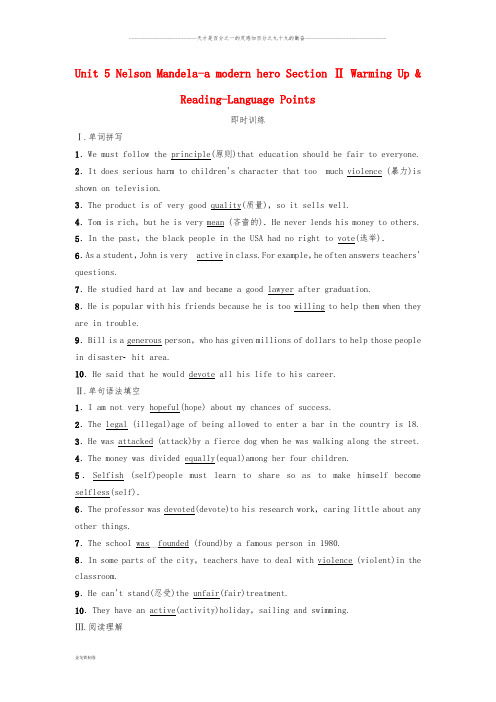
Unit 5 Nelson Mandela-a modern hero Section Ⅱ Warming Up &Reading-Language Points即时训练Ⅰ.单词拼写1.We must follow the principle(原则)that education should be fair to everyone. 2.It does serious harm to children's character that too much violence (暴力)is shown on television.3.The product is of very good quality(质量),so it sells well.4.Tom is rich,but he is very mean (吝啬的).He never lends his money to others. 5.In the past,the black people in the USA had no right to vote(选举).6.As a student,John is very active in class.For example,he often answers teachers' questions.7.He studied hard at law and became a good lawyer after graduation.8.He is popular with his friends because he is too willing to help them when they are in trouble.9.Bill is a generous person,who has given millions of dollars to help those people in disasterhit area.10.He said that he would devote all his life to his career.Ⅱ.单句语法填空1.I am not very hopeful(hope) about my chances of success.2.The legal (illegal)age of being allowed to enter a bar in the country is 18. 3.He was attacked (attack)by a fierce dog when he was walking along the street. 4.The money was divided equally(equal)among her four children.5.Selfish (self)people must learn to share so as to make himself become selfless(self).6.The professor was devoted(devote)to his research work,caring little about any other things.7.The school was__founded (found)by a famous person in 1980.8.In some parts of the city,teachers have to deal with violence (violent)in the classroom.9.He can't stand(忍受)the unfair(fair)treatment.10.They have an active(activity)holiday,sailing and swimming.Ⅲ.阅读理解Stephen Hawking was born in Oxford,England on 8th January,1942.He went to school in St Albans—a small city near London.Although he did well,he was never top of his class.After leaving school,Hawking went first to Oxford University where he studied physics,then he went to Cambridge University where he studied cosmology(宇宙学).As he himself admitted he wasn't very serious about studying.He was a very lazy student,and did very little work.However,he still achieved extremely good marks.Hawking first noticed something was wrong with him at the age of 20.He started to bump into things,and often fell over for no reason.When he visited his family at Christmas time,his father was so worried that he was sent to hospital for test.Finally,the result came back.Hawking had motor neurone disease(运动神经元病),an incurable illness which causes the muscles of the body to waste away.Doctors said he would die before he was 23.At first,Hawking became extremely depressed (忧郁的).After a while,though,he began to see his life in a different way.As he later wrote,“Before my illness had been diagnosed (诊断),there had not seemed to be anything worth doing.But shortly after I came out of hospital,I suddenly realized that there were a lot of worthwhile things I could do.” Hawking married,found a job at Cambridge University,where he still works today,and had three children.He also went to do some of the most important scientific research ever carried out.His story shows that nobody,however bad their situation is,should lose hope,“Life is not fair,” he once said.“You just have to do the best you can in the situation you are in.”1.As a university student,Stephen Hawking ________.A.worked extremely hardB.studied moths and chemistryC.was lazy and did very little workD.only achieved average marks解析:细节理解题。
必修五unit2Warming up
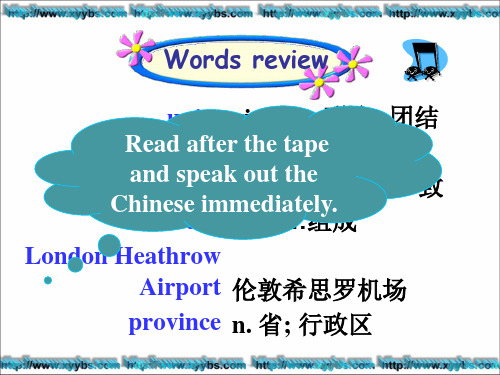
Famous universities
University of Cambridge
University of Durham (杜伦大学)
University of Oxford
literary works
food
A full English breakfast (全英式早餐)
with fried egg, sausage, white and black pudding, bacon, mushrooms, baked beans, hash browns (土豆煎饼), toast, and half a tomato
In England in the Se_p4_t-e_5m_beyrebaefrosre toheldy turn five
In Wales in the September before turning five children with birthdays between March and August start school in the August following their fifth birthday;
Words review
unite vi. & vt. 联合; 团结
Rkienagddaofmternt.h王e t国ape
ancdonspsiesatkvoi.u组t t成he; 在于; 一致
Chinese consist
oimf m由e…dia…te组ly.成
London Heathrow
Airport 伦敦希思罗机场
Fish & chips, popular takeaway food of the UK
Yorkshire Pudding
高中英语 Unit 5 Section Ⅱ Warming Up & Reading Language Points课件 新人教版选修6

2.wave
[教材P34原句]
The lava that flows slowly like a wave
down the mountain causes far more damage because it buries everything in its path under the molten rock. 然而,顺着山坡往下流的像波浪一样的火山熔岩所造 成的损失却大得多,这是因为火山岩浆所流经的地方,
9. suit n.一套外衣;套装vt.适合;使适宜→ suitable adj.
合适的 10. actual adj.实在的;实际的 → actually adv.实际上 11. equipment n.设备;装备→ equip vt.配备;装备 12. appoint vt.任命;委派→ appointment n.任命; 委派;约会;约定
covered our whole body, helmets, big boots and special gloves. 我们都穿着白色的防护服遮住全身,戴上了头盔和
特别的手套,还穿了一双大靴子。
(1)n.一套外衣;套装 ①The color of the business suit suits the young lady well. 这套公务装的颜色非常适合这位女士。
Unit 5 Section Ⅱ 语言点一 识 记 掌 握 理 解 拓 展 应 用 落 实 语言点二 识 记 掌 握 理 解 拓 展 应 用 落 实 语言点三 识 记 掌 握 理 解 拓 展 应 用 落 实 课 时 跟 踪 检 测
A.词义配对 1.alongside A.a raised line of water that moves across the surface of the sea 2.evaluate B.that can or may come into existence;
人教版高中英语必修5 Unit2 Warming up课件
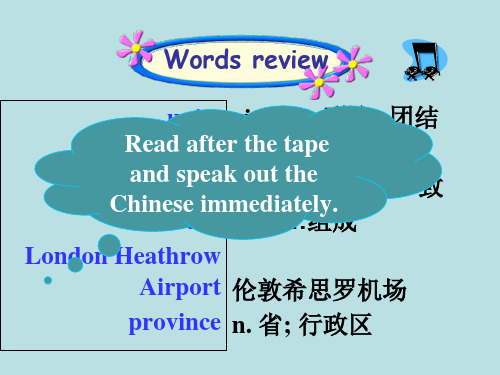
Can you name the capital cities of the countries of the UK? How about the capital of the UK?
England London
Wales Cardiff
Scotland
Edinburgh London is the
It lies to the northwest of Europe. The UK is surrounded by the Atlantic Ocean, with the North Sea to its east, the English Channel to its south and the Celtic Sea to its south-southwest. The Irish Sea lies between Great Britain and Ireland.
to:在…方/边;位于…方向,在…以南/北/西北…
t的Wo某此h个处er方用e向于is。表th例示e:某U人K/?物/某个地方在另一人/物/地方
John's standing to the left of Adrian in the photo.
照片中约翰站在阿德里安的左边。
Knutsford is about 16 miles to the south of Manchester. 纳茨福德位于曼彻斯特以南约16英里
Unit 2
The United Kingdom
Warming Up
What’s the name of the country?
the United Kingdom? the UK?
Review:
the United Kingdom
高二英语必修五Unit 5 section 2

拄着拐棍,这位老人能够稳稳地走路了。 ③He went to the aid of the hurt man. 他前去帮助那受伤的人。
人教版英语 · 必修5
课前自主预习
要点层级解读
课时演练广场
课前自主预习
要点层级解读
课时演练广场
[归纳拓展]
(1)do sb.an injury(=do an injury to sb.) 伤害某人
be an injury/injuries to sb./sth. 危害,损伤 (2)injure v. 使受伤;损害,伤害(感情) (3)injured adj. 受伤的
②When she fell ill her daughter took over the business from
her. 她患病期间生意曾由她女儿代管。
人教版英语 · 必修5
课前自主预习
要点层级解读
课时演练广场
③He was just falling asleep when there was a loud knock at the
Unit 5
Section Ⅱ
First aid
Warming Up & Reading— Language Points
课前自主预习
要点层级解读
课时演练广场
人教版英语 · 必修5
课前自主预习
要点层级解读
课时演练广场
Ⅰ.重点单词 一、将下列单词与所对应的英文解释连线
1.temporary
2.choke 3.complex force 4.swell
人教版英语 · 必修5
高中英语 Unit 5 Music Section Ⅱ Warming Up Rea
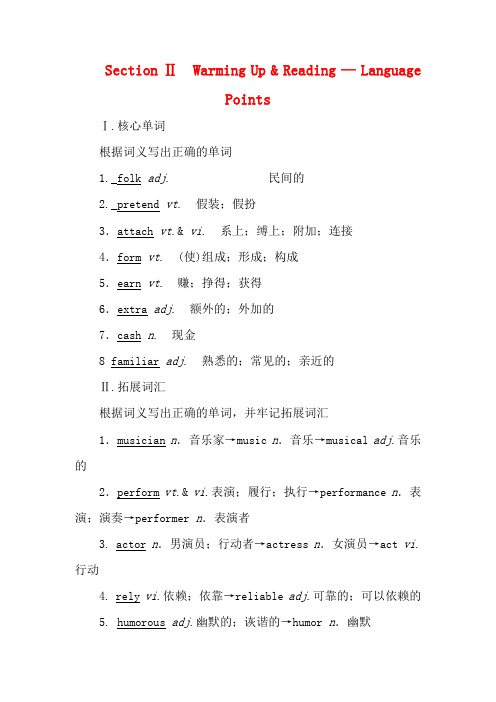
Section ⅡWarming Up & Reading —LanguagePointsⅠ.核心单词根据词义写出正确的单词1._folk adj. 民间的2._pretend vt. 假装;假扮3.attach vt.& vi. 系上;缚上;附加;连接4.form vt. (使)组成;形成;构成5.earn vt. 赚;挣得;获得6.extra adj. 额外的;外加的7.cash n. 现金8 familiar adj. 熟悉的;常见的;亲近的Ⅱ.拓展词汇根据词义写出正确的单词,并牢记拓展词汇1.musician n.音乐家→music n.音乐→musical adj.音乐的2.perform vt.& vi.表演;履行;执行→performance n.表演;演奏→performer n.表演者3. actor n.男演员;行动者→actress n.女演员→act vi.行动4. rely vi.依赖;依靠→reliable adj.可靠的;可以依赖的5. humorous adj.幽默的;诙谐的→humor n.幽默6. attractive adj.吸引人的;有吸引力的→attract vt.吸引→attraction n.吸引;吸引力Ⅲ.阅读词汇写出下列单词的汉语意义1.classical adj. 古典的;古典文艺的2.instrument n. 工具;器械;乐器3.jazz n. 爵士音乐4.fame n. 名声,_名望5.passerby n. 过路人6.pub n. 酒馆;酒吧7.studio n. 工作室;演播室8.millionaire n. 百万富翁;富豪9.reunite vt. 再统一;再联合;重聚Ⅳ.重点短语根据汉语意思补全短语1.dream of 梦见;梦想;设想2.to be honest 说实在的;实话说3. attach... to 认为有(重要性、意义);附上;连接4. in cash 用现金;有现钱5.break up 打碎;分裂;解体6.play jokes _on 戏弄7. rely on 依赖;依靠8.or so 大约Ⅴ.重点句型1.v.ing作主语They may start as a group of highschool students, for whom practising_their_music in someone's house is the first step to fame.他们开始可能是一群中学生,对他们来说,在某个人家里排练音乐是成名的第一步。
人教版高中英语必修5课件:Unit2 Warming up (共29张PPT)
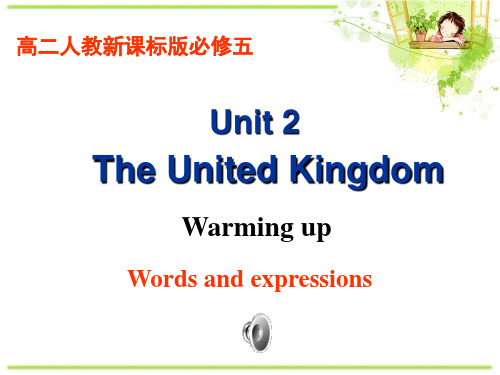
Northern Scotland Ireland
the United Kingdom
England Wales
2. How long does it take to fly from Beijing to London Heathrow Airport? B A. About six hours. B. About ten hours. C. About sixteen hours.
The national flag of the UK is called the Union Jack.. The official language is English. The capital city of the UK is London. Tony Blair is the Prime Minister and his office is located in Downing Street. Now let’s enjoy more pictures.
5. Which is the longest river in England? B
A.
B.
The River Avon The River Thames C.
The River Severn
6. Which is the national flag of the UK?
A.
B.
C.
C
7. Which is the national flower of the UK?
高二人教新课标版必修五
Unit 2
The United Kingdom
Warming up
Words and expressions
When you mention England, what or who will you think of?
人教版英语必修五Unit 5(Warming up and Reading)课件(共39张PPT)
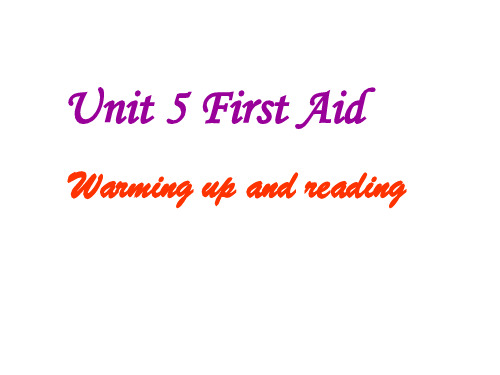
Part 1. The functions of the skin
First
aid
for burns
Part 2. Causes of burns
first degree
Part 3. Types of burns
second degree third degree
Part 4: Characteristics of burns
Because bacteria from the clothes and jewellery could infect the burns.
4. If someone has a third degree burn, why might you see tissue?
Because all layers of the skin have been burnt showing the tissue underneath.
Read Part 1 and find out The functions of skin:
1)Protect you against diseases , poisons and the sun’s harmful rays ;
2) Keep you warm or cool ; 3) Prevent you from losing too much water;
any blisters and the wound may get infected.
3.Don’t put cold water on __th__ir_d__ degree burns
4.Never put _b__u_tt_e_r,_o_i_l_or _o_i_n_tm__e_n_t on burns
必修五Unit2warmingupandReading

4. What are the provinces called in
England? A A. Counties. B. Departments.
Big Ben 大本钟
C. States.
London Tower Bridge 伦敦塔桥
5. Which is the longest river in England? B
C.An introduction to the United Kingdom about its foundation and development based on geography, history, politics, and culture etc.
Information about the UK
Complete the sentences
England Wales Scotland
Northern Ireland
A.
B.
Cherry C.
Rose
Maple
B
8. Which is the national animal of the UK?
A.
B.
B
Beaver 海狸 C.
Redbreast 知更鸟 Bald eagle秃鹰
Reading
PUZZLES IN GEOGRAPHY
Fast-Reading
Great Britain
England
the UK
How the UK was formed
Wales was linked to England in the 13th century AD.
Wales England
Scotland In 1603
人教版高中英语必修五Unit2 Warming up and reading 课件
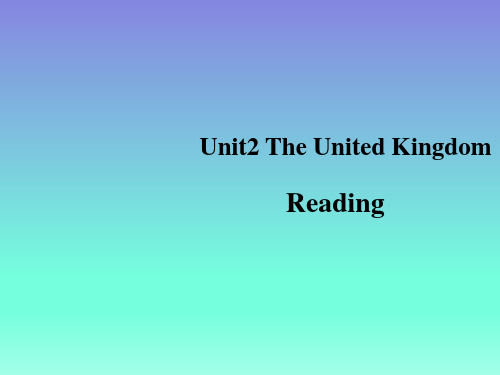
Fast reading
Task 1 Knowing the UK: Para 1-3
Q1: What countries make up Great Britain? Q2: How was the UK formed? Q3: In what ways are the four countries different?
Fast reading
in 17th Century
Scotland England
Q2: Great Britain:
Wales
Fast reading
in early 20th Century
Get Ireland connected to form the United Kingdom
Fast reading
Homework:
Finish your writing and share it with your classmates.
Post-reading
Writing:
Create your own posters to introduce the UK.(3-4 sentences)
Some useful expressions: be made up of… , flag…, different…, 3 zones, … invaders…
……
Queen Victoria
Big Ben
Cambridge University
England
Princess Diana
2021-2022学年高中英语人教版必修五教学案:Unit 5 Section Ⅱ Word版含答案

Section ⅡWarming Up & Reading — Language Points一、这样记单词记得准·写得对记得快·记得多Ⅰ.基础词汇1.temporary adj.临时的;临时的2.choke v i.&v t. (使)噎住;(使)窒息an n. 器官4.barrier n. 屏障;障碍(物)plex adj. 简单的6.liquid n. 液体7.scissors n.(pl.) 剪刀8.squeeze v t.&v i. 榨;挤;压榨9.vital adj. 至关重要的;生死攸关的10.symptom n. 症状;征兆11.pour v t.&v i. 倒;灌;注;涌12.damp adj. 潮湿的1.temporary adj.临时的;临时的[反义]permanent adj.永久的[联想]contemporary adj.当代的;同时代的an n.器官[联想]器官及身体部位相关词汇合锦①lung n.肺②liver n.肝③skin n.皮;皮肤④ankle n.踝(关节)⑤wrist n.手腕⑥tissue n.(生物)组织3.liquid n.液体[联想]物质的各种存在形式①solid n.固体adj.牢固的;固体的②steam n.蒸汽;水蒸气③gas n.煤气;气体4.scissors n.(pl.)剪刀[规律]一些成双成对的名词通常只有复数形式,常见的还有:①jeans牛仔裤②headphones耳机③trousers裤子④glasses眼镜⑤shoes鞋子⑥compasses圆规Ⅱ.拓展词汇1.bleed v i.&v t.流血→blood n.血;血液2.injury n.损伤;损害→injure v t.使受伤;弄伤→injured adj.受伤的3.poison n.毒药;毒害v t.毒害;使中毒→poisonous adj.有毒的d adj.稍微的;温存的;温存的→mildly ad v.稍微地;温存地5.swell v i.&v t.(使)膨胀;隆起→swollen adj.肿胀的6.unbearable adj.难以忍受的;不能容忍的→bearable adj.可忍受的;能应付的→bear v.忍受7.variety n.变化;多样(化);多变(性)→vary v i.变化;变动→various adj.各种各样的5.vital adj.至关重要的;生死攸关的[同义]important; of great importance6.aid n.&v t.挂念;救济;资助[联想]“挂念”家族①help n.&v t.挂念②assist v t.挂念;帮忙③support n.&v t.支持;挂念④sponsor v t.赞助⑤fund v t.资助⑥do sb. a favour挂念某人⑦give/lend sb. a hand挂念某人7.与“急救”有关的词汇①poison n.&v t.毒药;使中毒②injury n.损伤;损害③choke v i.&v t.(使)噎住;(使)窒息④bleed v i.&v t.流血⑤treat v t.&v i.治疗⑥cure v t.治愈⑦apply v t.涂;敷⑧first aid急救二、这样记短语记坚固定短语多积常用词块1.first_aid(对伤患者的)急救2.fall_ill 生病3.get_injured 受伤4.a_variety_of 各种各样的5.electric_shock 触电;电休克6.squeeze_out 榨出;挤出7.over_and_over_again 反复;多次8.in_place 在适当的位置;适当1.an essential part必不行少的部分2.a barrier against ... 抵挡……的一道屏障3.a sense of touch 触觉4.within a day or two 一两天内5.tissue and organs under the skin皮下组织和器官6.take off 脱掉7.icy water 冰水8.get infected 感染三、这样记句式先背熟再悟通后仿用1.... it is where you feel cold, heat or pain and it gives you your sense of touch.……正是皮肤使你感到冷、热或苦痛,它还使你有触觉。
2019_2020学年高中英语Unit5NelsonMandelaamodernheroSectionⅡWarmingUp (1)

Section ⅡWarming Up & Reading—Language Pointsquality n.质量;品质;性质(教材P33)And what qualities does a great person have?而且一个伟人需要具有什么样的品质呢?of good/high/poor quality 质量好/高/差的improve the quality 提高质量①He has many good qualities, but his best quality is his kindness.他有许多良好的品质,而最好的品质是为人善良。
②As a matter of fact, air in many cities is of poor quality.事实上,许多城市的空气质量很差。
[链接写作]——完成句子据报道,这个城市的空气质量在过去的六个月有了改善。
As is reported, the air quality in the city has improved over the past six months.mean adj.吝啬的;自私的;卑鄙的;刻薄的vt.意指;意思是(经典例句)Don’t be too mean to others, or you’ll never make any friends.不要对别人太刻薄,否则你交不到朋友。
(1)be mean with sth. 对某物吝啬be mean to sb. 对某人刻薄(2)mean to do sth. 打算做某事mean doing sth. 意味着做某事①In my opinion, that is a mean thing to do.依我看来,那是一件很卑鄙的事情。
②The rich boss who is usually mean to his workers is mean with money.那位富有的老板通常对他的工人很刻薄,对钱非常吝啬。
【最新】高中英语人教版必修5 Unit 2教案(Warming up 及阅读)
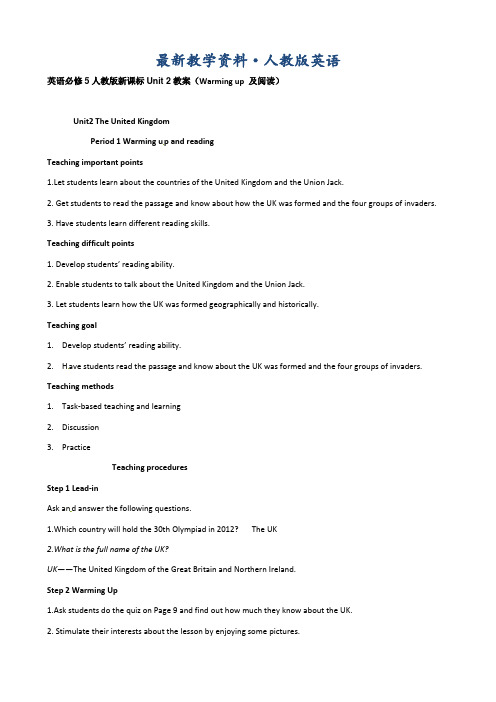
最新教学资料·人教版英语英语必修5人教版新课标Unit 2教案(Warming up 及阅读)Unit2 The United KingdomPeriod 1 Warming u p and readingTeaching important points1.Let students learn about the countries of the United Kingdom and the Union Jack.2. Get students to read the passage and know about how the UK was formed and the four groups of invaders.3. Have students learn different reading skills.Teaching difficult points1. Develop students’ reading ability.2. Enable students to talk about the United Kingdom and the Union Jack.3. Let students learn how the UK was formed geographically and historically.Teaching goal1.Develop students’ reading ability.2.H ave students read the passage and know about the UK was formed and the four groups of invaders. Teaching methods1.Task-based teaching and learning2.Discussion3.PracticeTeaching proceduresStep 1 Lead-inAsk an d answer the following questions.1.Which country will hold the 30th Olympiad in 2012? The UK2.What is the full name of the UK?UK——The United Kingdom of the Great Britain and Northern Ireland.Step 2 Warming Up1.Ask students do the quiz on Page 9 and find out how much they know about the UK.2. Stimulate their interests about the lesson by enjoying some pictures.Step 3 Pre-readingLet students discuss and answer the question.✧Can you name the capital cities of the countries of the UK?England London伦敦Wales Cardiff加迪夫Scotland Edinburgh爱丁堡North Ireland Belfast贝尔法斯特Step 4 ReadingListen and answerAsk the students to listen the tape and divide the passage into three parts and match the main idea of each part. Part 1(Para 1-3) the cultural importance of London (About London)Part 2(Para 4)How the UK came into being. (About the UK)Part 3(Para 5-6)England is divided into 3 zones. (About England)✧Part1 About the UK(Para 1-3)1. Analyze how the UK came into being.2. Ask the students to answer the question.The Union Jack flag unites the flags of three countries in the United Kingdom. Which country is left out? Why? Suggested answer:Wales. Because it is usually considered to be part of Englan d.3. Using the information of part 1 to fill in the blanksThe full name of England is the ______ ________ of Great Britain and Northern Ireland .It consists of four parts ,they are __________,__________,_________ and ________________, people always think ______is a part of England. The flag of the UK is called the __________ ______.The four countries have different ___________and ______ _______as well as different _________ ______.Suggested answer:United Kingdom England Wales Scotland North Ireland Wales Union Jackeducational legal systems football teams✧Part2 About the England(Para 4)1. Ask the students to read the Para 4 and tell the three zones.the South of England the Midlands the North of England2. Using the information of part 2 to fill in the blanks.Most population settled in ___________________.Most of the large industr ial cities are in ___________________.Nationwide, many cities have ________________________.Suggested answer:the South of Englandthe North and the Midlandsworld-famous football teamsPart3 About the London(Para 5-6)1.Ask the st udents to read the Para 5 and tell the four sets of invaders.They are the Romans the Anglo-Saxons the Vikings the Normans3.The last part tells us about the invaders’ influence on England and London.Re ad it and try to fill in the table below, and answer a question.The ViWhich group of the invaders did not influence London?The Vikings3. Tru e or False1.The oldest castle in London was constructed by Norman rulers in 1066.2.London has the oldest port built by the Normans in the 1st century AD.3.The oldest building in London was begun by the Anglo-Saxons in the 1060s.4.The first invaders Normans left their towns and roads.5.The Vikings influenced the vocabulary and place-names of the North of England. Suggested answer: TFTFTStep4 SummaryUsing the information from the reading passage, complete the following form.the largest of the four countries, consists of the South, theare the Romans, Anglo-Saxons , Vikings and Normans.Step5 Homework1. Learn the useful words and expressions in this part by heart.2. Read the reading pas sage again and try to retell it in your own words.。
- 1、下载文档前请自行甄别文档内容的完整性,平台不提供额外的编辑、内容补充、找答案等附加服务。
- 2、"仅部分预览"的文档,不可在线预览部分如存在完整性等问题,可反馈申请退款(可完整预览的文档不适用该条件!)。
- 3、如文档侵犯您的权益,请联系客服反馈,我们会尽快为您处理(人工客服工作时间:9:00-18:30)。
in aid of ④I’m collecting money ________starving children.
害。身体上出现明显的伤口 主要用于有生命的东西,既可指肉体上 hurt n. & v. 的非故意伤害,也可指感情上或精神上 的伤害 指对人或物的伤害或损坏,多用于有生 harm n. & v. 命的东西,常指伤及一个人或其健康、 权利、事业等
3.(教材 P34)You can get burned by a variety of things: hot liquids, steam, fire, radiation (by being close to high heat or fire, etc), the sun, electricity or chemicals. 你可能由于各种原因而烧伤:灼热的液体、水蒸气、火、辐 射(由于靠近高温或火等)、阳光、电或化学物品。
为了帮助饥饿的孩子们,我正在募捐。
fall ill [用法]
生病
We are easy to fall ill in the pressure. 我们在压力下比较容易生病。 [辨析] 试一试 fall ill, be ill 选择上述短语填空
fell ill The teacher ______suddenly while she was giving class.Since
①Foreign aid from many countries poured into the famine area. 来自许多国家的外国援助纷纷到达饥荒地区。
with the aid of ②Teachers give their lessons ______________computers.
squeeze vt.& vi.
榨;挤;压榨
[记法]
[用法] ①I squeezed myself into a crowded bus with great difficulty. 我好不容易挤进了拥挤的公共汽车。 ②Tom took off his wet clothes and squeezed the water out. 汤姆脱下了湿衣服,拧出了水。 ③He managed to squeeze through the crowd at last. 他总算费力地挤过了人群。
over and over again 2.The journalists asked her the same question____________________.
ill 3.My mother used to be in good health, but she fell ______suddenly last
week.
in hing________.
a variety of 5.The shop has ___________patterns of clothes for you to choose from.
first aid the patient. 6.What a pity that I couldn’t give/offer ________to
他是这样的一个人,情绪每天都有变化。 ④The menu in the restaurant varies with the season. 这家饭店的菜单随季节而变化。
4. (教材 P34)For second degree burns, keep cloths cool by putting them back in a basin of cold water, squeezing them out and placing them on the burned area over and over again for about an hour until the pain is not so bad. 对于二度烧伤,要保持湿布清凉,需把湿布放回冷水中,拧 出水后再放在烧伤面上,这样要反反复复地做一个小时左右, 直到不太痛时为止。
fall短语大集合 爱上„„ 形成„„习惯 欠债 安静下来 入睡;睡着
①fall in love with ... ②fall into the habit of ... ③fall into debt ④fall silent ⑤fall asleep
2.(教材 P33)Often the illness or injury is not serious, but there are other times when giving first aid quickly can save lives. 通常情况下这种疾病或损伤不是很严重,但也有一些时候迅 速实施急救能挽救生命。
项目二 必会短语
Ⅰ.根据汉语提示写出短语 1.________ first aid 2.______ fall ill get injured 3.___________ a variety of 4.___________ 5._____________ electric shock (对伤患者的)急救 生病
受伤
各种各样的 触电;电休克 榨出;挤出 反复;多次
squeeze out 6.___________ and over again 7.over __________________
in place 8.________
在适当的位置;适当
Ⅱ.选用以上短语填空(其中有两项是多余的)
got injured 1.He fell off his bike and his left leg__________.
hurt to me. ③The failure was a great_____ wound the war. ④He received a bad leg _______in
辨一辨
强调对“身体的伤害,损伤”,多指在 injury n. wound n. & v. 意外事故或天灾中受伤
指用枪弹或刀、剑等锐器故意施加的伤
①People like to live a life full of variety. 人们喜欢过丰富多彩的生活。 ②He collected varieties of rare stamps. 他搜集各种珍贵的邮票。
varies from to ③He is such a person whose mood ___________day ___day.
温和地
12._____ _______adj.肿胀的 swell vi. & vt.(使)膨胀;隆起→swollen
unbearable adj.难以忍受的;不能容忍的→________ 13.___________ bearable adj.可忍受的;能应付的→bear v.忍受 variety n.变化;多样(化);多变(性)→vary vi.变化 ; 14._______ 变动→various adj.各种各样的
[辨析] 试一试 injury, wound, hurt, harm 选择上述单词填空
injury to the liver. ①Excessive use of this drug can result in_______
harm calling him. ②There is no ______in
师生共研——理解掌握是根本
1.(教材 P33)First aid is a temporary form of help given to someone who suddenly falls ill or gets injured before a doctor can be found. 急救就是在找到医生之前对突然生病或受伤的人给予临时性 的帮助。
3.The old man almost ________( chocked 窒息) to death in the thick smoke.
4.The mountains form a natural _______( barrier 屏障) between
the two countries. 5.To the teacher’s surprise, the boy worked out such a complex 复杂的) math problem. ________(
temporary 暂时的) job during the 6.Ellen has got a __________( summer vacation.
liquid 液体). 7.Oil, milk and water are all ______(
Ⅱ.拓展单词 8._____ bleed vi. & vt.流血→blood n.血;血液 injury n.损伤;伤害→injure vt.使受伤;弄伤→injured 9._______ adj.受伤的 poison n.毒药;毒害vt.毒害;使中毒→poisonous adj.有 10._______ 毒的 mildlyadv.轻微地; 11._____ mild adj.轻微的;温和的;温柔的→______
has been ill then she ___________for half a year.
那位老师上课时突然生病。自那时起她已经病了半年了。
辨一辨
fall ill be ill
[联想]
强调突然病倒。短暂性动词短语,不与表示一段时 间的状语连用
表示生病的状态。延续性动词短语,可与表示一段 时间的状语连用
variety n.变化;多样(化);多变(性)
[记法] vary(i)(变化)+(e)ty(名词后缀)→variety(变化;多样化)
